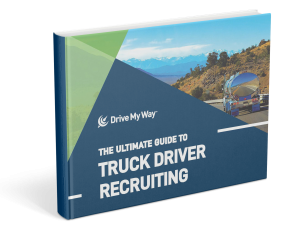
Life is change. Every aspect of life brings unique moments of transitions, whether personal or professional. A new job, a changing family dynamic, a big move, a worldview or cultural shift – to name only a very few. Transitioning into military life, and then eventually reversing that shift back into civilian life is perhaps one of the most dramatic transitions that American adults routinely make, yet this change can be largely unsupported for many veterans, including those who enter the trucking industry.
Sergeant David Pike, Director of Recruiting for NFI, is on a mission to help bridge that gap for his fellow service members. This article sheds light on the unique experiences and hurdles faced by veterans as they make the transition to civilian life. We also highlight the ongoing work of NFI, a company committed to supporting veterans in their journey. As Sgt. Pike continues to share his story and champion programs supporting veterans in trucking, we hope you’ll join us in the conversation by asking the veterans on your own team, “How are you today?” and “How can I help make a meaningful change for veterans in this workplace?”
Visible and Invisible Challenges
Transitioning from military to civilian life brings about challenges that often remain invisible to those unfamiliar with the journey. In 1980, approximately 18% of U.S. adults were military veterans. As of 2022, that number has fallen to only 6% (Pew Research Center, 2023). In other words, if you are a veteran transitioning from military service to civilian life today, only about 1 in every 17 adults has been through a similar experience. In contrast, that number is much higher in the transportation industry. 1 out of every 10 truckers in the United States is a veteran (United States Census Bureau).
In the military to civilian transition, veterans may be given basic re-entrance resources through programs such as the Transition Assistance Program from the U.S. Government. However, the reacclimation process of adapting to new routines and organization structures, translating military skills into civilian jobs, confronting mental health concerns, and reconstructing personal relationships requires persistent, ongoing effort.
Sgt. Pike shared a recent interview that he watched that he felt captured the challenges of a military to civilian transition:
It was a Marine veteran [speaking] about the military. You’re just not allowed to show weakness, no matter how painfully you’re struggling inside. I don’t care if your spouse is cheating on you, I don’t care. If you’re going through bankruptcy, I don’t care. If your child is in the hospital, I don’t care. When you show up in uniform, you have to show 100% strength or your troops don’t follow. That’s armor.
Now, when we enter the civilian world, zero help is given to any veteran of how to take that armor off. We’re great leaders, and soldiers will follow because they know that is the order of rank and structure. And secondly, in combat, if they don’t do it, people will die. That is not the structure in civilian life, and that is a huge struggle for so many of our veterans that manifests itself into a lot of mental health struggles.
Employers can help smooth this transition with intentional, sustainable support.
Showing Commitment as a Carrier
Addressing the challenges of transitioning to civilian life requires a concerted effort from both veterans and the organizations that aim to support them. As an employer in trucking, there are large and small ways to increase your support for veterans. Veterans In Trucking suggests starting with high-visibility actions like displaying the American flag online, recognizing service with decals on rigs, or clearly partnering with organizations that honor veterans. In our conversation, Sgt. Pike also shared NFI’s growing initiatives and his hopes to amplify industry-wide conversations to better support veterans who are truck drivers.
Once service members have joined your team, creating a supportive environment of like-minded individuals is key. NFI does this through Employee Resource Groups (ERGs). One of their ERG’s, the Veterans Engagement Team (VET), is specifically designed to connect, serve, and advocate for Veterans within NFI and throughout the communities where they operate. In 2023, NFI surveyed the members of VET about their top concerns and priorities for the coming year. An overwhelming 57% of respondents indicated that they wanted to focus on the transition from military to civilian life as a crucial issue.
We don’t have enough resources built for our veterans, we don’t have enough of the ability for veterans to transition from military to civilian life. So when we got those results back in [from the VET survey], out of roughly 50 responses, transition to civilian life was 57%. The next closest one was veteran suicide at 46%. I think that we have to be better in tune with what our veterans are asking for, without them actually asking for it.
– Sgt. David Pike
Pike shared that, as the head of the recruiting team, he is leading efforts to distribute welcome packets with easily accessible resources, create a mentorship program, and actively aligning themselves with and supporting charitable organizations that benefit veterans. This is just one example of how employers can support veterans.
Seek the Cause, not the Symptoms
Speaking with Sgt. Pike highlighted a crucial distinction between symptoms and causes in the context of veteran support. While symptoms, like poor mental health, are undeniably significant, it’s equally vital to address the underlying causes, particularly the lack of robust transition resources for veterans. Poor mental health, including conditions like PTSD, anxiety, or depression, is a symptom resulting from the challenges veterans face during their transition to civilian life. However, these challenges are often rooted in systemic issues such as insufficient support networks, inadequate recognition of military-acquired skills, and a general lack of awareness among employers. It’s imperative to go beyond treating the symptoms by focusing on comprehensive solutions that tackle the root causes.
By enhancing transition resources, including targeted programs, education for employers, and initiatives fostering understanding, the trucking industry can proactively address the core issues contributing to poor mental, emotional, or physical health among veterans.
A Call to Arms
Bridging the gap for veterans transitioning to civilian life is a collective responsibility that requires both individual and organizational commitment. Sgt. David Pike’s dedication to this cause sheds light on the challenges faced by veterans entering the trucking industry and underscores the importance of proactive measures to support their journey.
As veterans navigate the visible and invisible challenges of the military to civilian transition, it is evident that addressing symptoms alone is insufficient. NFI’s commitment, exemplified through initiatives like the Veterans Engagement Team (VET) and strategic partnerships with charitable organizations, serves as a promising blueprint. By actively engaging in the military-to-civilian transition dialogue and developing tailored support, NFI showcases tangible steps employers can take. However, the true impact lies in recognizing and addressing the systemic issues underpinning the challenges faced by veterans. Employers in the trucking industry must not only address the symptoms but also invest in comprehensive solutions.
A holistic approach must delve into the root causes. It is imperative for employers to go beyond symbolic gestures and that they actively invest in robust transition resources, provide recognition and education for military-acquired skills, and contribute to creating workplaces that honor and support the well-being of those who have served our country.







